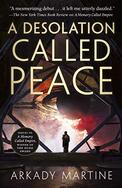A Desolation Called Peace is a direct sequel to A Memory Called Empire and picks up shortly after that book's ending. It would completely spoil the first book and builds heavily on previous events. This is not a series to read out of order.
It's nearly impossible to discuss anything about the plot of this book without at least minor spoilers for the previous book, so beware. If you've not read A Memory Called Empire, I highly recommend it, and you may want to skip this review until you have.
Mahit Dzmare has returned to Lsel Station and escaped, mostly, the pull of the Teixcalaan Empire in all its seductive arrogance. That doesn't mean Lsel Station is happy to see her. The maneuverings of the station council were only a distant part of the complex political situation she was navigating at the Teixcalaanli capital. Now home, it is far harder to ignore powerful councilors who would be appalled by the decisions she made. The ambassador to a hated foreign empire does not have many allies.
Yaotlek Nine Hibiscus, the empire's newest commander of commanders, is the spear the empire has thrust towards a newly-discovered alien threat. The aliens have already slaughtered all the inhabitants of a mining outpost for no obvious reason, and their captured communications are so strange as to provoke nausea in humans. Their cloaking technology makes the outcome of pitched warfare dangerously uncertain. Nine Hibiscus needs someone who can talk to aliens without mouths, and that means the Information Ministry.
The Information Ministry means a newly promoted Three Seagrass, who is suffering from insomnia, desperately bored, and missing Mahit Dzmare. And who sees in Nine Hibiscus's summons an opportunity to address several of those problems at once.
A Memory Called Empire had an SFnal premise and triggering plot machinery, but it was primarily a city political thriller. A Desolation Called Peace moves onto the more familiar SF ground of first contact with a very alien species, but Martine makes the unusual choice of revealing one of the secrets of the aliens to the reader at the start of the book. This keeps the reader's focus more on the political maneuvering than on the mystery, but with a classic first-contact communication problem as the motivating backdrop.
That's only one of the threads of this book, though. Another is the unfinished business between Three Seagrass and Mahit Dzmare, and between Mahit Dzmare and the all-consuming culture of Teixcalaan. A third is the political education of a very exceptional boy, whose mere existence is a spoiler for A Memory Called Empire and therefore not something I will discuss in detail. And then there are the internal politics of Lsel Station, although I thought that was the least effective part of the book and never reached a satisfying conclusion.
This is a lot to balance, and I think that's one of the reasons why A Desolation Called Peace doesn't replicate the magic that made me love A Memory Called Empire so much. Full-steam-ahead pacing with characters who are thinking on their feet and taking desperate risks has a glorious momentum. Here, there's too much going on (not to mention four major viewpoint characters) to maintain the same pace. Once Mahit and Three Seagrass get into the same room, there are moments that are as good as the highlights of A Memory Called Empire, but it's not as sustained as I was hoping for.
This book also spends more time on Mahit and Three Seagrass's relationship, and despite liking both of the characters, this didn't entirely work for me. Martine uses them to make a subtle and powerful point about relationships across power gradients and the hurt that comes from someone trivializing a conflict that is central to your identity. It took me a while to understand the strength of Mahit's reaction, but it eventually felt right. But that fight wasn't what I was looking for in the book, and there was a bit too much of both of them failing (or refusing) to communicate for my taste. I appreciated what Martine was exploring, but personally I wanted a different sort of catharsis.
That said, this is still a highly enjoyable book. Nine Hibiscus is a solid military SF character who is a good counterweight to the more devious approaches of the other characters. I enjoyed the subplot of the kid in the Teixcalaanli capital more than I expected, although it felt more like setup for future novels than critical to the plot of this one. And then there's Three Seagrass.
Three Seagrass always made decisions wholly and entire. All at once. choosing information as her aptitudes. Choosing the position of cultural liaison to the Lsel Ambassador. Choosing to trust her. choosing to come here, to take this assignment — entirely, completely, and without pausing to look to see how deep the water was that she was leaping into.
Every word of this is true, and it's so much fun to read. Three Seagrass was a bit overshadowed in A Memory Called Empire, a supporting character in someone else's story. Here, she has moments where she can take the lead, and she's so delightfully different than Mahit. I loved every moment of her viewpoint.
A Desolation Called Peace isn't as taut or as coherent as A Memory Called Empire. The plot sags in a few places, and I think there was a bit too much hopeless Lsel politics, nebulous alien horror, and injured silence between characters. But the high points are nearly as good as the high points of A Memory Called Empire and I adore these characters. If you liked the first book, I think you'll like this one too.
More, please!
Reviewed: 2021-05-15
